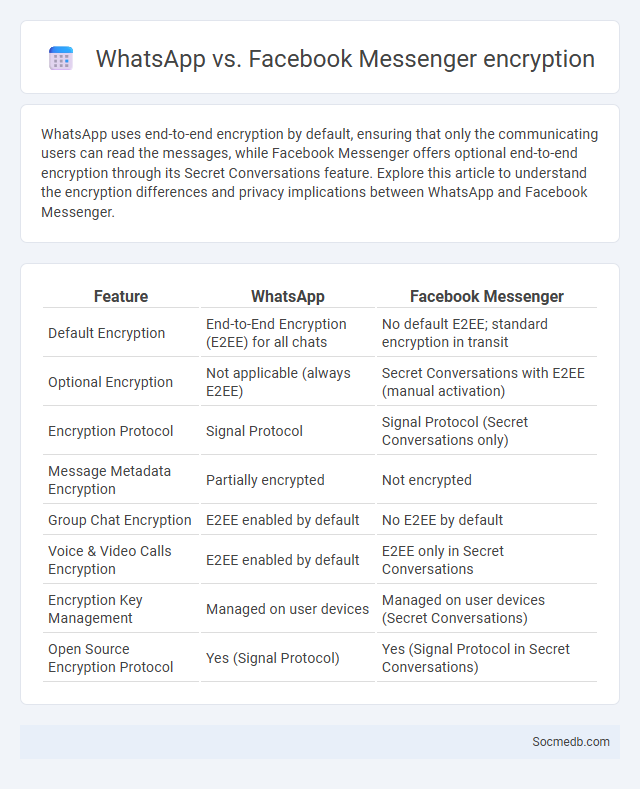
Photo illustration: WhatsApp vs Facebook Messenger encryption
WhatsApp uses end-to-end encryption by default, ensuring that only the communicating users can read the messages, while Facebook Messenger offers optional end-to-end encryption through its Secret Conversations feature. Explore this article to understand the encryption differences and privacy implications between WhatsApp and Facebook Messenger.
Table of Comparison
| Feature | Facebook Messenger | |
|---|---|---|
| Default Encryption | End-to-End Encryption (E2EE) for all chats | No default E2EE; standard encryption in transit |
| Optional Encryption | Not applicable (always E2EE) | Secret Conversations with E2EE (manual activation) |
| Encryption Protocol | Signal Protocol | Signal Protocol (Secret Conversations only) |
| Message Metadata Encryption | Partially encrypted | Not encrypted |
| Group Chat Encryption | E2EE enabled by default | No E2EE by default |
| Voice & Video Calls Encryption | E2EE enabled by default | E2EE only in Secret Conversations |
| Encryption Key Management | Managed on user devices | Managed on user devices (Secret Conversations) |
| Open Source Encryption Protocol | Yes (Signal Protocol) | Yes (Signal Protocol in Secret Conversations) |
Understanding WhatsApp and Facebook Messenger
WhatsApp and Facebook Messenger are leading instant messaging platforms owned by Meta, offering seamless communication through text, voice, and video calls. Both apps prioritize end-to-end encryption, ensuring your messages and calls remain private and secure, while supporting multimedia sharing and group chats for enhanced social interaction. Understanding their features helps you leverage these tools effectively for personal connections and business engagement.
What Is Encryption in Messaging Apps?
Encryption in messaging apps is a security technology that converts messages into unreadable code, ensuring only the intended recipient can decrypt and read the content. End-to-end encryption (E2EE) is a common standard, protecting data from interception by hackers, service providers, or third parties during transmission. Popular apps like WhatsApp and Signal use E2EE to safeguard user privacy and maintain message confidentiality.
End-to-End Encryption: Definition and Importance
End-to-end encryption (E2EE) secures social media communications by ensuring messages are encrypted on the sender's device and only decrypted on the recipient's device, preventing interception by third parties. This encryption method protects user privacy by safeguarding personal data from hackers, governments, and even the social media platforms themselves. E2EE is crucial for maintaining confidentiality in direct messaging, voice, and video calls, reinforcing trust and security in digital interactions.
How WhatsApp Implements End-to-End Encryption
WhatsApp uses end-to-end encryption to secure messages, ensuring only you and the recipient can read the content, preventing interception by third parties including WhatsApp itself. This encryption employs the Signal Protocol, generating unique cryptographic keys on users' devices for every conversation to protect data in transit and at rest. Your privacy is maintained as encryption keys never leave your device, making all calls, texts, photos, and videos fully confidential and shielded from unauthorized access.
Facebook Messenger’s Encryption Capabilities
Facebook Messenger employs end-to-end encryption through its Secret Conversations feature, ensuring that only you and the message recipient can read the content. This encryption uses the Signal Protocol, which provides robust protection against eavesdropping and unauthorized access. Leveraging these capabilities, your private communications remain secure, fostering trust and confidentiality in digital messaging.
Comparing Encryption Standards: WhatsApp vs Facebook Messenger
WhatsApp uses end-to-end encryption with the Signal Protocol, ensuring messages are only readable by the sender and recipient, while Facebook Messenger offers optional end-to-end encryption through its Secret Conversations feature. WhatsApp's encryption is enabled by default for all chats and calls, providing comprehensive privacy, whereas Facebook Messenger's standard messages are encrypted in transit but stored on servers without full end-to-end protection. This difference emphasizes WhatsApp's stronger default security stance compared to Facebook Messenger's more limited encrypted communication options.
Security Vulnerabilities and Risks
Social media platforms often harbor security vulnerabilities such as weak authentication protocols, data breaches, and phishing attacks that expose sensitive personal information. Cybercriminals exploit these risks to conduct identity theft, spread malware, and launch social engineering schemes targeting your accounts. Strengthening your privacy settings and using multi-factor authentication are essential steps to mitigate these security threats effectively.
Privacy Implications for Users
Social media platforms collect extensive personal data, raising significant privacy concerns for users. Your information can be shared with third parties or used for targeted advertising without explicit consent. Maintaining awareness of privacy settings and cautious sharing habits is essential to protect your online identity.
How to Enable End-to-End Encryption on Each Platform
To enable end-to-end encryption on popular social media platforms, start with WhatsApp by navigating to Settings > Chats > Chat Backup and ensuring that "End-to-End Encrypted Backup" is activated for secure messaging. On Signal, encryption is automatic for all conversations, but you can verify security by checking the contact's safety number under chat settings. For Facebook Messenger, turn on Secret Conversations by opening a chat, tapping the info icon, and selecting "Go to Secret Conversation" to ensure your messages are encrypted from sender to receiver, protecting your privacy effectively.
Which App Offers Superior Encryption Protection?
Signal offers superior encryption protection with its end-to-end encryption protocol that ensures only you and the recipient can read the messages. WhatsApp also uses strong end-to-end encryption, but Signal's open-source code allows independent verification of its security. Telegram provides encryption only in its Secret Chats, making Signal the top choice for secure communication.
 socmedb.com
socmedb.com